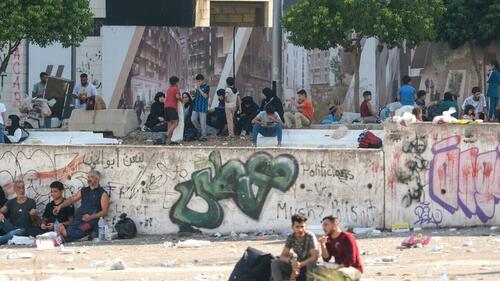
As many as one million people in Lebanon could be displaced by dozens of Israeli airstrikes that have hit the country's capital over the past few days, caretaker Prime Minister Najib Mikati told reporters on Sunday.
"The number of displaced people... could reach a million. Let’s not forget the large influx from the south and the Bekaa," Mikati said following an emergency cabinet meeting, calling the situation "the largest displacement movement that may have happened" in the country.

Caretaker Environment Minister Nasser Yassin echoed Mikati's words, announcing that about 250,000 people have taken refuge in government-run and informal shelters. However, he stressed that the total number is about "four times as many directly affected and/or displaced outside the shelters."
Hundreds of thousands of Lebanese have been forced to seek shelter away from their homes in southern cities and the Beirut suburbs over recent days. Many families have been forced to sleep out in the open in public spaces, as shelters quickly became overcrowded.
The UN Office for the Coordination of Humanitarian Affairs (OCHA) in Lebanon this week said in a statement that "Humanitarian needs have reached unprecedented levels that have exhausted current efforts and resources."
Since Monday, some 22,331 displaced Syrians living in Lebanon have crossed back into Syria, along with 22,117 Lebanese, according to Lebanese authorities.
The forced displacement of citizens across the country follows intense attacks by the Israeli army in the south and east of the country, as well as dozens of airstrikes in the capital Beirut. According to officials, between 8 pm Friday and midnight Saturday, Beirut's southern suburbs were subjected to 82 Israeli airstrikes.
⚡️ Lebanese families sleep in the open after being displaced from their homes in the southern suburbs of Beirut, due to the continued aggression of the occupation. pic.twitter.com/k0rySIjKe5
— Middle East Observer (@ME_Observer_) September 28, 2024
The most brutal of these hit on Friday evening, when seven residential buildings were razed to the ground by 82 US-made bombs dropped in the Beirut suburb of Dahiye.
Hezbollah Secretary-General Hassan Nasrallah was killed in the blitz, along with one of the movement's senior commanders, Ali Karaki, and Abbas Nilforoushan, deputy for operations of Iran’s Islamic Revolutionary Guard Corps (IRGC).
On Saturday, the Lebanese health ministry announced that at least 1,640 people have been killed and 8,408 injured in Israeli attacks since 8 October.
Refugees seeking to get into Syria from Lebanon:
BREAKING:
— Megatron (@Megatron_ron) September 29, 2024
🇱🇧🇪🇺 Huge columns of refugees are now heading to Europe from Lebanon via Syria after Israel began bombing their homes. pic.twitter.com/sao4cNke6V
The latest humanitarian crisis to rock Lebanon comes as the country continues to grapple with an unprecedented economic collapse that plunged over 80 percent of the population below the poverty line and an energy crisis that sees the state provide as little as two hours of electricity to the population per day.
As many as one million people in Lebanon could be displaced by dozens of Israeli airstrikes that have hit the country’s capital over the past few days, caretaker Prime Minister Najib Mikati told reporters on Sunday.
“The number of displaced people… could reach a million. Let’s not forget the large influx from the south and the Bekaa,” Mikati said following an emergency cabinet meeting, calling the situation “the largest displacement movement that may have happened” in the country.

Caretaker Environment Minister Nasser Yassin echoed Mikati’s words, announcing that about 250,000 people have taken refuge in government-run and informal shelters. However, he stressed that the total number is about “four times as many directly affected and/or displaced outside the shelters.”
Hundreds of thousands of Lebanese have been forced to seek shelter away from their homes in southern cities and the Beirut suburbs over recent days. Many families have been forced to sleep out in the open in public spaces, as shelters quickly became overcrowded.
The UN Office for the Coordination of Humanitarian Affairs (OCHA) in Lebanon this week said in a statement that “Humanitarian needs have reached unprecedented levels that have exhausted current efforts and resources.”
Since Monday, some 22,331 displaced Syrians living in Lebanon have crossed back into Syria, along with 22,117 Lebanese, according to Lebanese authorities.
The forced displacement of citizens across the country follows intense attacks by the Israeli army in the south and east of the country, as well as dozens of airstrikes in the capital Beirut. According to officials, between 8 pm Friday and midnight Saturday, Beirut’s southern suburbs were subjected to 82 Israeli airstrikes.
⚡️ Lebanese families sleep in the open after being displaced from their homes in the southern suburbs of Beirut, due to the continued aggression of the occupation. pic.twitter.com/k0rySIjKe5
— Middle East Observer (@ME_Observer_) September 28, 2024
The most brutal of these hit on Friday evening, when seven residential buildings were razed to the ground by 82 US-made bombs dropped in the Beirut suburb of Dahiye.
Hezbollah Secretary-General Hassan Nasrallah was killed in the blitz, along with one of the movement’s senior commanders, Ali Karaki, and Abbas Nilforoushan, deputy for operations of Iran’s Islamic Revolutionary Guard Corps (IRGC).
On Saturday, the Lebanese health ministry announced that at least 1,640 people have been killed and 8,408 injured in Israeli attacks since 8 October.
Refugees seeking to get into Syria from Lebanon:
BREAKING:
🇱🇧🇪🇺 Huge columns of refugees are now heading to Europe from Lebanon via Syria after Israel began bombing their homes. pic.twitter.com/sao4cNke6V
— Megatron (@Megatron_ron) September 29, 2024
The latest humanitarian crisis to rock Lebanon comes as the country continues to grapple with an unprecedented economic collapse that plunged over 80 percent of the population below the poverty line and an energy crisis that sees the state provide as little as two hours of electricity to the population per day.
Loading…





